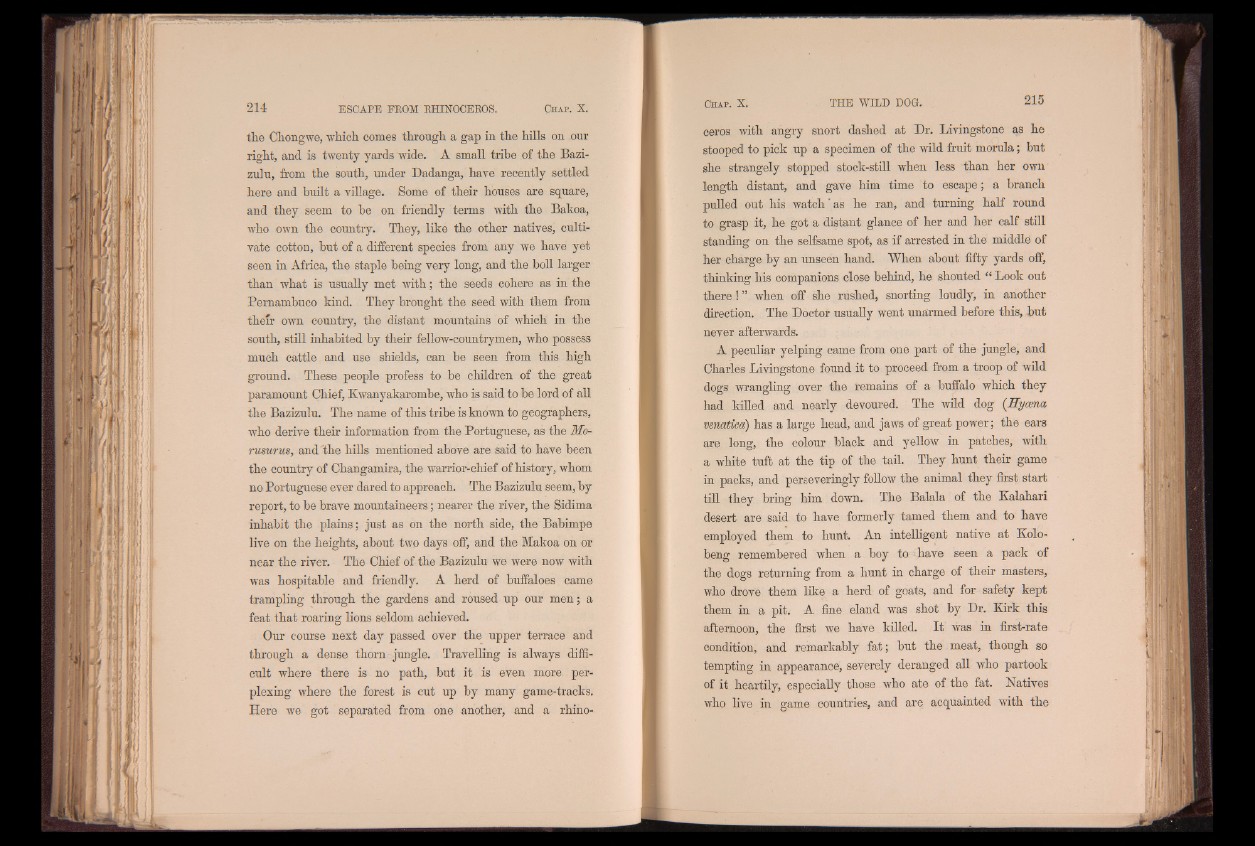
the Chongwe, which comes through a gap in the hills on our
right, and is twenty yards wide. A small tribe of the Bazi-
zulu, from the south, under Dadanga, have recently settled
here and built a village. Some of their houses are square,
and they seem to he on friendly terms with the Bakoa,
who own the country. They, like the other natives, cultivate
cotton, hut of a different species from any we have yet
seen in Africa, the staple being very long, and the boll larger
than what is usually met with; the seeds cohere as in the
Pernambuco kind. They brought the seed with them from
their own country, the distant mountains of which in the
south, still inhabited by their fellow-countrymen, who possess
much cattle and use shields, can he seen from this high
ground. These people profess to he children of the great
paramount Chief, Kwanyakarombe, who is said to be lord of all
the Bazizulu. The name of this tribe is known to geographers,
who derive their information from the Portuguese, as the Mo-
rumrus, and The hills mentioned above are said to have been
the country of Changamira, the warrior-chief of history, whom
no Portuguese ever dared to approach. The Bazizulu seem, by
report, to be brave mountaineers; nearer the river, the Sidima
inhabit the plains; just as on the north side, the Babimpe
live on the heights, about two days off, and the Makoa on or
near the river. The Chief of the Bazizulu we were now with
was hospitable and friendly. A herd of buffaloes came
trampling through the gardens and roused up our men; a
feat that roaring Hons seldom achieved.
Our course next day passed over the upper terrace and
through a dense thorn jungle. Travelling is always difficult
where there is no path, hut it is even more perplexing
where the forest is cut up by many game-tracks.
Here we got separated from one another, and a rhinoceros
with angry snort dashed at Dr. Livingstone as he
stooped to pick up a specimen of the wild fruit morula; but
she strangely stopped stock-still when less than her own
length distant, and gave him time to escape; a branch
pulled out his watch 'as he ran, and turning half round
to grasp it, he got a distant glance of her and her calf still
standing on the selfsame spot, as if arrested in the middle of
her charge by an unseen hand. When about fifty yards off,
thinking his companions close behind, he shouted “ Look out
there ! ” when off she rushed, snorting loudly, in another
direction. The Doctor usually went unarmed before this, but
never afterwards.
A peculiar yelping came from one part of the jungle, and
Charles Livingstone found it to proceed from a troop of wild
dogs wrangling over the remains of a buffalo which they
had killed and nearly devoured. The wild dog (Eycena
venatica) has a large head, and jaws of great power; the ears
are long, the colour black and yellow in patches, with
a white tuft at the tip of the tail. They hunt their game
in packs, and perseveringly follow the animal they first start
till they bring him down. The Balala of the Kalahari
desert are said to have formerly tamed them and to have
employed them to hunt. An intelligent native at Kolo-
beng remembered when a boy to have seen a pack of
the dogs returning from a hunt in charge of their masters,
who drove them like a herd of goats, and for safety kept
them in a pit. A fine eland was shot by Dr. Kirk this
afternoon, the first we have killed. I t was in first-rate
condition, and remarkably fat; but the meat, though so
tempting in appearance, severely deranged all who partook
of it heartily, especially those who ate of the fat. Natives
who live in game countries, and are acquainted with the